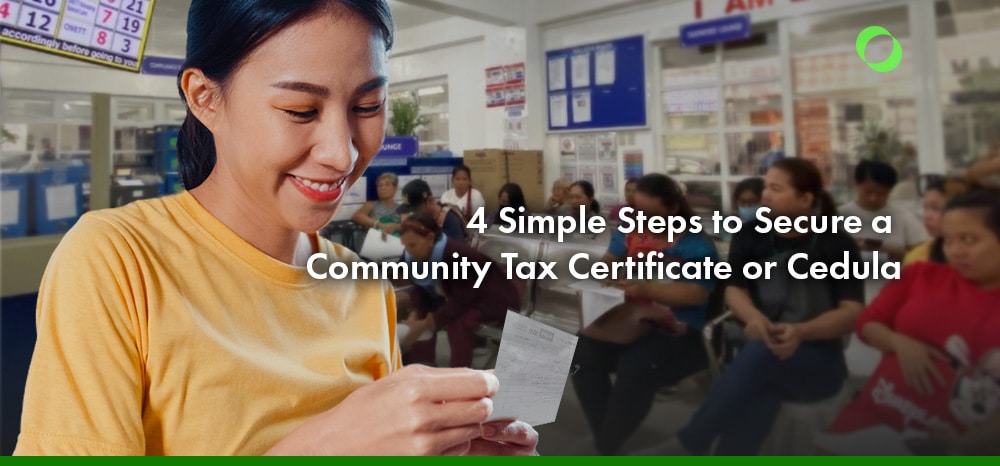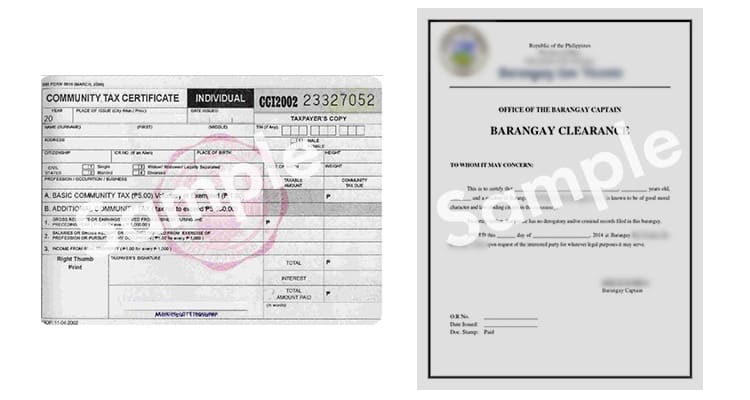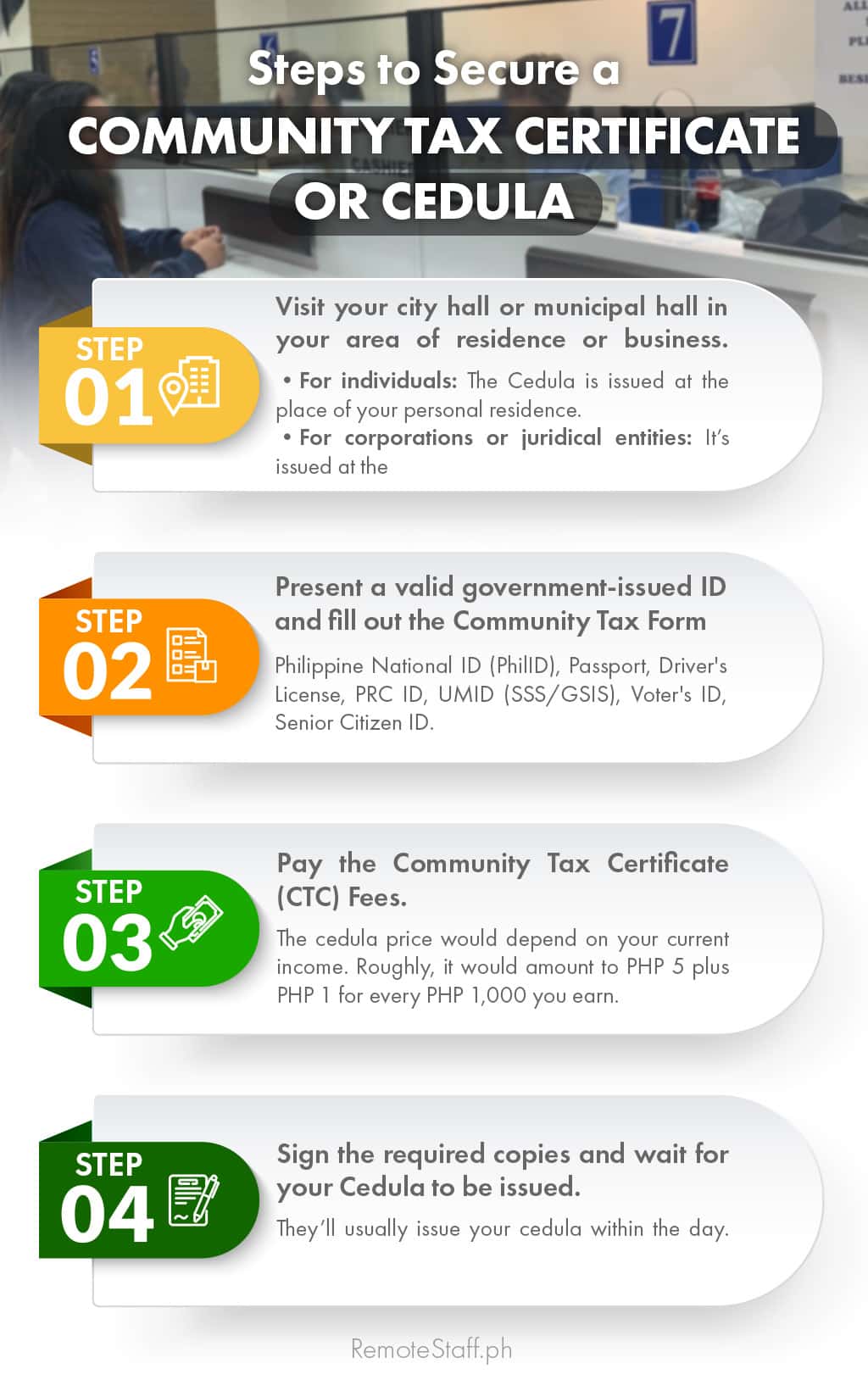When you register at the BIR as a remote worker, one of the requirements is a Community Tax Certificate or a Cedula.
What is a Cedula Used For?
A Community Tax Certificate (CTC) serves as an official document that confirms you’ve paid your community tax and is often requested in different transactions.
A cedula is also a multipurpose document you’ll often need in both personal and professional transactions. In fact, it’s commonly mentioned in any fresh graduate guide since it’s often one of the first documents new workers need.
Some common uses include:
- Employment requirement – Some employers may ask for a cedula for employment as part of your onboarding documents.
- BIR registration requirement – Considered part of the TIN ID requirements, it supports your documents at the Revenue District Office (RDO).
- Applying for business permits – a cedula is part of the standard requirements when securing new permits or renewing them.
- Supporting ID in government transactions – It can serve as a secondary ID when dealing with agencies like SSS, PhilHealth, or Pag-IBIG.
- Local government processes – Some LGUs may also require it for availing of community services or clearances.
Eligibility
So who is eligible to get a Cedula? You can get one if you are
- An inhabitant of the Philippines who is 18 years or older.
- Individuals who are salaried employees for at least 30 consecutive working days during any calendar year.
- An inhabitant of the Philippines who is engaged in a business or occupation.
- An inhabitant of the Philippines who owns real property with a collective assessed value of Php 1,000 or more.
- An inhabitant of the Philippines who is required by law to file income tax returns.
Community Tax Certificate Requirements
Cedula requirements vary depending on the municipality. For most, you must have the following:
Individuals:
- A valid government-issued ID (you can present any Valid ID Philippines such as a driver’s license, passport, or voter’s ID)
- Community Tax Declaration Form (CTDF) — provided on-site
- Copy of payslips or proof of income, if available
Individuals with a Business / Business Owners:
- A valid government-issued ID of the proprietor or authorized representative
- Community Tax Declaration Form (CTDF) — provided on-site
- Approved business tax declaration, reflecting gross income or property value
- Business registration documents (e.g., DTI, SEC, or Mayor’s Permit)
- Proof of personal income (if applicable, e.g., payslips)
Difference Between a Cedula and a Barangay Clearance
Many people confuse a Cedula with a Barangay Clearance, but they serve different purposes:
Cedula (Community Tax Certificate)
- Issued by: City/Municipal Treasurer’s Office (or sometimes the Barangay Treasurer for convenience).
- Purpose: Proof of payment of community tax; required for business permits, BIR registration, legal documents, and contracts.
- Validity: 1 year, renewable annually.
- Based on: Your income, property, or earnings (with corresponding fees).
Barangay Clearance
- Issued by: Your Barangay Hall.
- Purpose: Proof of residence and good standing in your barangay; usually required for local job applications, IDs, business permits, or police clearance.
- Validity: Typically 6 months to 1 year (depends on barangay policy).
- Based on: Residency and certification by barangay officials, not income.
In short: The Cedula proves you’ve paid your community tax, while the Barangay Clearance proves you live in a certain barangay and are in good standing there.
Steps to Secure a Community Tax Certificate or Cedula
So how to get your Cedula? Here are 4 simple steps:
Step 1: Visit your city hall or municipal hall in your area of residence or business.
If you’re wondering where to get a cedula, the primary issuing authority is your city hall or municipal hall.
You should always secure your Cedula from the office that covers your place of residence or business. This means:
- For individuals: The Cedula is issued at the place of your personal residence.
- For corporations or juridical entities: It’s issued at the location of the principal office—i.e., the business address.
While the City or Municipal Treasurer’s Office is the main issuing authority, many LGUs provide additional, more convenient locations where you can process your Cedula:
- Barangay Halls – Some barangays are authorized to issue Cedulas, making it easier if you prefer to process it closer to home.
- Satellite Offices & Mall Service Centers – Larger cities often set up satellite offices in malls or commercial areas to reduce long queues at city hall.
- Mobile or Pop-up Government Service Centers – During renovations or special drives, some LGUs open temporary booths in transit hubs, barangays, or shopping centers.
- E-Cedula Kiosks & Online Applications – Select LGUs (like Cebu and Angeles) now offer online filing or kiosks that speed up the process.
Tip: Always check with your LGU first to confirm which nearby offices or service centers issue Cedulas, as availability may differ per city or municipality.
Step 2: Present a valid government-issued ID and fill out the form.
Step 3: Pay the CTC Fees.
So how much is a cedula?
The cedula price would depend on your current income. Roughly, it would amount to PHP 5 plus PHP 1 for every PHP 1,000 you earn.
The amount won’t exceed Php 5,000.
Here are some sample cedula fees breakdown based on income level:
- No income yet (new freelancer / no clients): You only pay the minimum Php 5.
- Income of Php 50,000/year: Php 5 + (Php 50,000 ÷ 1,000 × Php 1) = Php 55 total.
- Income of Php 150,000/year: Php 5 + (Php 150,000 ÷ 1,000 × Php 1) = Php 155 total.
- Income of Php 1,000,000/year: Php 5 + (Php 1,000,000 ÷ 1,000 × Php 1) = Php 1,005 total.
High-income earners: Even if your computation goes beyond Php 5,000, you’ll only pay the maximum Php 5,000.
Step 4: Sign the required copies and wait for your Cedula to be issued.
They’ll usually issue your cedula within the day. That’s it!
Cedula Validity and Renewal Process
So how long is the validity of a cedula?
A Community Tax Certificate is valid for one year from the date of issue.
This means you’ll need to renew it every year to keep it updated and usable for official transactions.
When, Where, and How to Renew
You can renew your Cedula once it expires, and most people do so at the start of the year since it’s commonly required for permits and government transactions.
Renewal is done at the same place where you first got your Cedula — usually the city or municipal hall (Treasurer’s Office) or, in some areas, the barangay hall — and you simply follow the same process as before.
Replacement of Lost or Damaged Cedula
Unfortunately, under the Local Government Code of 1991, there is no legal provision for reprinting or issuing a Cedula with a duplicate CTC number.
Once it’s lost or damaged, it cannot be replaced with an identical copy.
Instead, you’ll need to apply for a new Cedula, which will be issued with a fresh cedula number and date.
This means going through the same process as when you first applied, including paying the applicable fees again.
Common Issues and How to Avoid Them
When applying for or renewing a Cedula, a few common mistakes can cause delays or extra fees:
Forgetting to bring a valid ID – Always bring at least one valid government-issued ID (e.g., driver’s license, passport, or voter’s ID) to confirm your identity.
- Going to the wrong office – Remember that Cedulas are issued only by your city or municipal hall (Treasurer’s Office) or, in some cases, your barangay hall. Going to the wrong place wastes time and may force you to start over.
- Misdeclaring income – If you underreport or incorrectly declare your income, the Treasurer’s Office may recheck your documents and recalculate your fees, leading to delays. Always be honest and accurate when filling out forms.
- Not bringing enough cash – Payment is usually done in cash, and while fees are small, it’s best to prepare enough, especially if you’re declaring higher income levels.
By keeping these points in mind, you can make the process quicker and smoother.
Final Steps: Using Your Cedula for Remote Work
Now that you have your Cedula, you can use it to register your remote working practice in the BIR.
However, if you don’t have an online job yet, it’s better to register when you already have one. You can sign up with Remote Staff for the best remote working opportunities for Filipinos.
Remote Staff can even assist you with your BIR registration – as well as provide other statutory benefits (SSS, PhilHeath, and PAGIBIG).
Register today!






